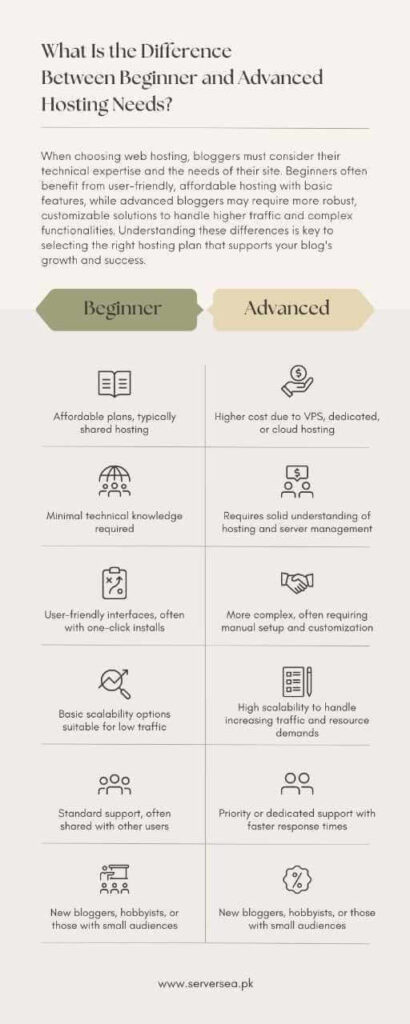What Is the Difference Between Beginner and Advanced Hosting Needs?

Choosing the right web hosting is critical for launching a website for online success. But, the hosting of a beginner differs significantly from the advanced users. Understanding the differences help in making informed decisions aligning with website’s goals, budget and performance requirements.
Beginner Hosting Needs
Simplicity is the key for beginners. When starting out a personal blog, basic portfolio and small business websites, you require a hosting plan that is easy to manage, cost-effective and provides a solid foundation without the overwhelming technical complexities.
User-Friendly Interface: Beginner hosting plans have a user-friendly control panel such as Plesk or cPanel, to manage your website. The interfaces are designed for simplifying tasks such as email accounts setting, domain management and installation of CMS such as WordPress.
Affordability: Your budget can be limited as a beginner. Shared hosting is the right option when a website needs shared server resources with other sites. The option is affordable and makes it perfect for businesses that don’t want extensive resources.
Basic Performance: Beginner websites have low to medium traffic. That’s why they don’t require high-performing capabilities required by advanced users. Basic hosting plans have sufficient bandwidth & storage for accommodating traffic level.
Limited Customization: Beginners don’t or may not require customization options. Basic hosting provides enough flexibility for getting your site up and running without going into complicated setups.
Advanced Hosting Needs
As a website grows, the online presence requires more resources. For example, advanced users of e-commerce sites and large-scale blogs with a high traffic volume are catered by robust hosting solutions offering better performance, control and enhanced security.
1. Enhanced Performance: Advanced hosting includes VPS and dedicated hosting that comes with additional resources such as CPU, RAM and bandwidth. This makes sure your website has high traffic volumes with fast loading times to offer a smooth user experience.
2. Greater Customization: Advanced users have to configure the server environment for suiting specific needs. VPS and dedicated hosting helps you install custom software, optimize server settings and tweak performance for matching exact requirements.
3. Advanced Security Features: Websites engaged in sensitive information such as online transactions need additional security. Advanced hostings come with SSL certificates, firewalls, regular backups and DDoS protection for safeguarding your data.
4. Scalability: As a website continues to grow, so should be the hosting plan. Advanced hosting solutions provide scalability, helping you to upgrade resources as the requirements increase without disruption and downtime.
Read also: The Impact of Cloud Computing on Modern Business Operations
Conclusion
Whether you are just getting started or an advanced user managing a high traffic website, understanding hosting needs is important. Beginners can opt for a simple, high-performance and a cheap web hosting solution. However, advanced users need to have a robust solution for enhanced performance, security and customization. Selecting the right hosting plan sets the foundation for a successful online presence.




